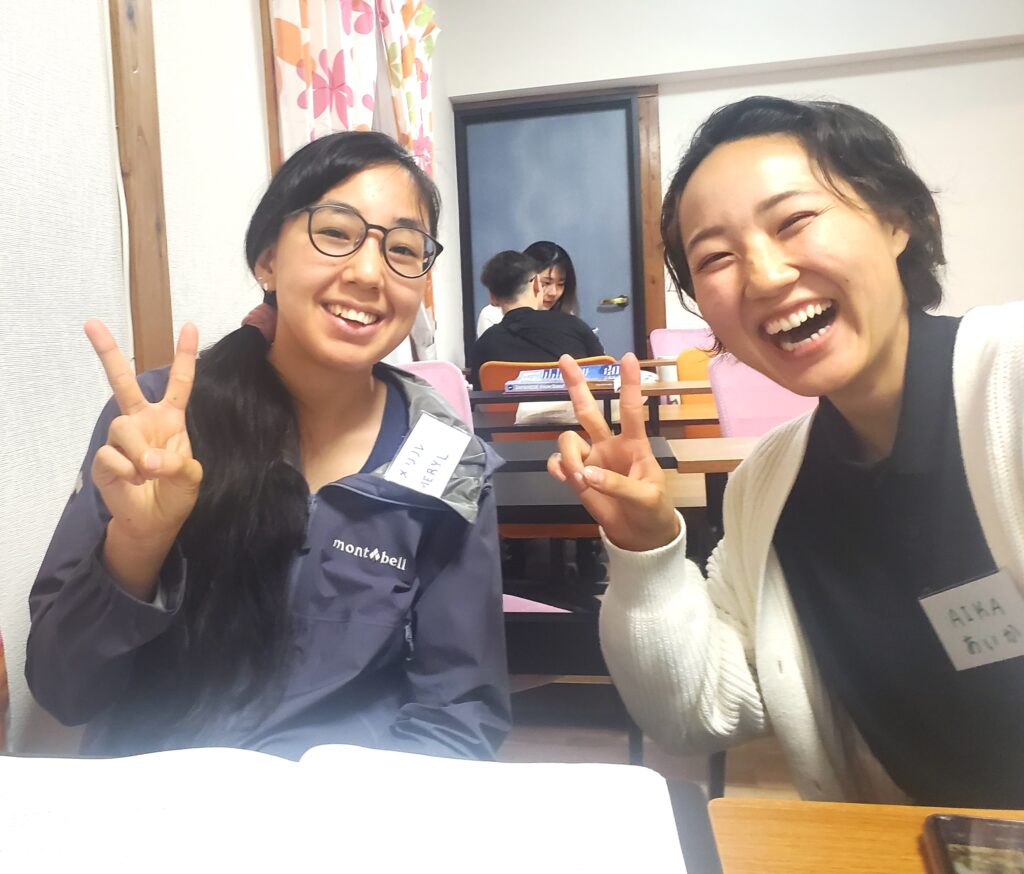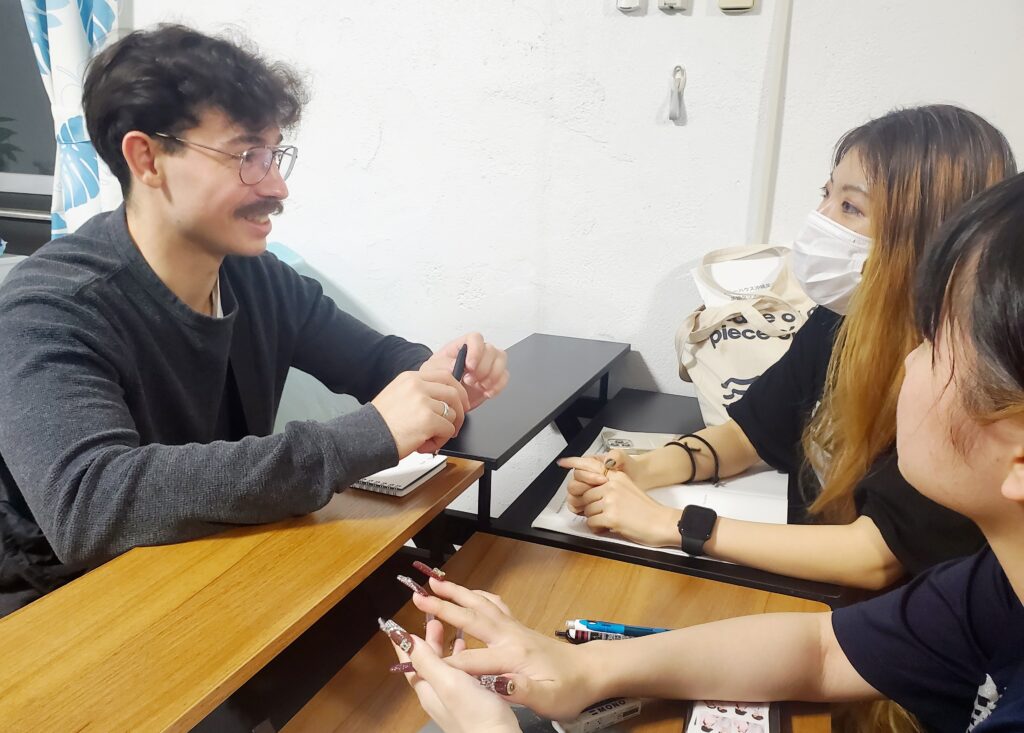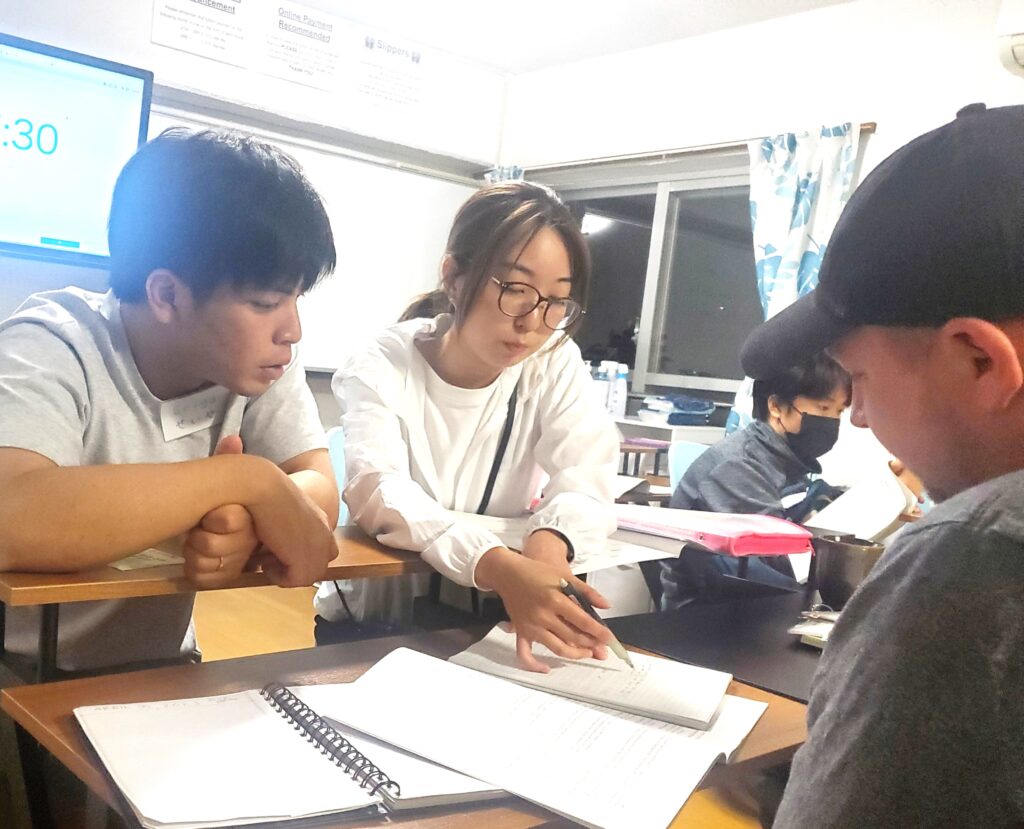Table of Contents
Language Exchange
Mixing Learning with Real Connections
We’re incredibly lucky at Blue House Okinawa to host local Japanese students who are eager to learn English.
This sets the stage for our Language Exchange program, an integral part of what we offer.
Picture this: engaging in genuine conversations with native Japanese speakers and experiencing the language as it’s truly spoken.
Learning Is a Two-Way Street
The Language Exchange is all about jumping in and getting involved.
It’s a student-driven, mutually beneficial setup where the real learning happens through exchange.
There’s no need to wait until your Japanese is flawless.
Start speaking from day one, even if it means getting creative with gestures to get your point across. Your Japanese counterparts are there to help guide you towards better accuracy.
Engage, Ask, Share
This is your chance to dive deeper than ever before.
Ask questions, exchange cultural insights, and offer feedback.
Building your speaking confidence comes from these real, interactive experiences.
The Language Exchange program is designed not just for you to practice Japanese, but to use it in practical, everyday situations.
Make Meaningful Connections
Through Language Exchange, you’ll meet and connect with our Japanese students.
These aren’t just language practice sessions; they’re opportunities to forge genuine friendships, understand the Japanese way of life, and gain insights that books alone can’t teach.
It’s about bringing your textbook knowledge into the vibrant, real world of communication.

Rules
Rule 1. Use your indoor voice.
We understand that Language Exchanges are a lot of fun and you enjoy interacting with the native speakers, but keep in mind that we have some students who are hard of hearing or have a hard time speaking up.
Please keep the noise level as LOW as possible.
Rule 2. Leave grammatical explanations to the instructors.
You can leave grammatical explanations to the instructors.
Try to avoid asking your Japanese friends questions about Japanese grammar (that’s what your instructors are for) and focus more on pronunciation /listening /speaking practice because your Japanese friends are not trained Japanese instructor.
Speaking Japanese fluently doesn’t mean they can teach how Japanese grammar works in English.
Also , trying to explain English grammar in English to the Japanese native speakers will only waste time and not benefit anyone because they won’t understand it.
When explaining something to the Japanese native speakers, please use VERY SIMPLE English!
Rule 3. Show and Tell.
Bring your phone (or tablet) to class.
If you feel like saying something in English / Japanese is difficult, feel free to look up pictures or videos to try and help the others understand what you’re trying to say.
We recommend NOT use translating apps, as sometimes the translation comes out entirely wrong or doesn’t make sense.
Try using actual photos and SHOW them what you are trying to say.
Example: We had a student talk about the movie “Frozen” so they looked up the word “frozen” in Japanese.
The translator showed the word “kouru”, literally meaning “to freeze” and showed that to the native speaker.
They couldn’t understand AT ALL because the Japanese movie title is “Anna and the Snow Queen”.
So, a lot of times the literal translation to some words and expressions can be VERY different.
Rule 4. When in doubt, ASK!
You can usually tell by your partner’s facial expression if they can understand you or not…but if you are not sure, ASK!
Sometimes they’ll nod and say they understand but they actually don’t. lol
So ask again and if they say they understand, ask them to explain.

How to do Langage Exchange
You will choose one of the following steps to practice during Language Exchange.
Step 1: Pronunciation Practice
Read aloud or have your partner read aloud the Japanese vocabulary /phrases on the worksheets and repeat after them. Practice matching your pronunciation to theirs.
Step 2: Quiz
Have your partner call out random numbers on the Japanese script Worksheet.
Recite the corresponding Japanese word / phrase of the number your partner called out on the English script worksheet and see how many of them you can get right.
Please circle the numbers that your partner gets right on their worksheets.
Step 3: Q&A Making
Make your own questions and answers on the back of the worksheet with your partner.
Try to use vocabulary /phrases you’ve learned in the lesson (or in previous lessons).
Step 4: Q&A Check
Have your partner check your Japanese grammar on the questions you created on the back of the worksheet.
Step 5: Conversation using Make Your Own! Q&A
Look at your Make Your Own Questions Conversation Sheet and ask your partner your own questions. See if they can understand your Japanese and if you can understand your partner’s answers.
Step 6: Free Conversation
If your partners’ speaking level is on par with yours, you can have free conversation.

Feeling Nervous About Speaking Japanese?
It’s pretty common to see folks hesitating to jump into a Japanese conversation.
Maybe you’re not quite sure how to get a particular word or phrase out right.
We get it, and honestly, it’s a hurdle you can clear pretty quickly once you’re part of the Blue House Okinawa family.
Speaking Practice Tips
Here, you’ll get plenty of chances to flex your conversational muscles through our Language Exchanges with native speakers.
These sessions are goldmines because they teach you two crucial things:
- Making mistakes is totally fine – actually, it’s part of the learning process!
- You’ll learn how to fix those slip-ups on the fly.
Remember,
You might be surprised to discover you know way more than you give yourself credit for.
The key is to keep trying and putting what you’ve learned into practice.
The more you do it, the smoother it’ll get.
And hey, remember this: Japanese folks find English just as tricky as you find Japanese.
They totally get the effort you’re making and will appreciate your attempts to chat in their language.
So flash that smile and dive in – you’re going to do awesome!
Who We Are
More Than a Language School
We are a close-knit community of Japanese and English learners! We teach each other and learn from each other.
Authentic Language Practice
Because we have both English classes and Japanese classes, there are endless opportunities to practice with native speakers.
Relaxed & Community-Centered
We believe in a community-oriented approach to learning. We support each other, grow, and laugh together.